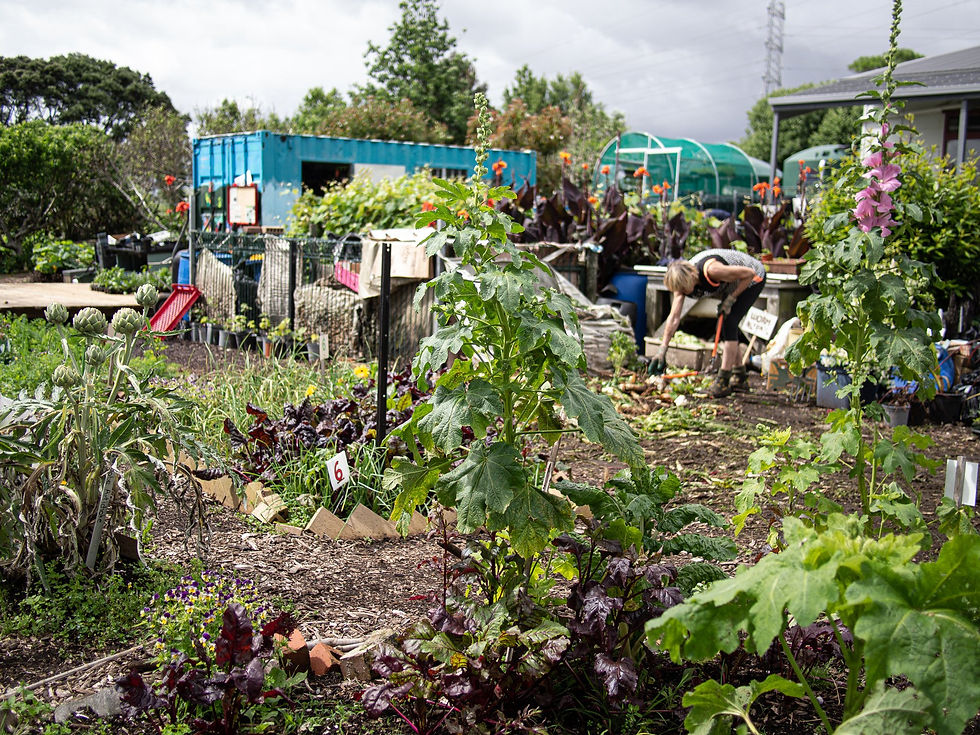
Triangle Park Community Garden, Massey
Increasing access to nourishing kai
At Healthy Families NZ, our vision is for Aotearoa to be a place where everyone has access to nourishing, culturally appropriate kai. Healthy Families NZ teams have been supporting communities to find ways to feed themselves by creating local food systems that foster wellbeing, protect and restore the environment, elevate mātauranga Māori and shared learning.
Ten years of working with whānau and community has led to the development of a Theory of Change for National and Local settings, with an intergenerational focus of unifying efforts towards a shared vision of creating equitable and sustainable food systems in Aotearoa.
National Theory of Change Localised Theory of Change
The current food system in Aotearoa is out of balance, prioritising economic growth and industrial food production over people's wellbeing and environmental sustainability.
By making small changes through implementing many initiatives across the motu, we can create a parallel system that supports whānau and communities to be well, have access to culturally appropriate and nourishing kai, and take care of the environment at the same time.
Mobilising collaborative networks and partnerships
Healthy Families Whanganui Rangitīkei Ruapehu supported a group of to form Kai Ora: Whanganui Kai collective bringing people together to strengthen local food system, read more
Healthy Families Waitākere brought together community organisations to find ways to collectively support the people of West Auckland, forming the roopu Kai West, read 2018-2023 Impact Report
Healthy Families Invercargill are part of the Murihiku Kai Collective, a group who pursue equity and resilience, elevating community voice and showcase Southland champions, innovators and suggest practical steps that councils, businesses, organisations and individuals can take to contribute towards food prosperity, read more
Healthy Families Far North has been a supporting capability around the Kai Ora partners table, responding to community voice and bringing whānau closer to decision making. The Kai Ora fund facilitates a small community grants process to support innovative projects that address food security, increase community resilience and encourage employment and economic development in Te Tai Tokerau, read more
Local food production
Healthy Families Far North contributed to the development of The Edible Playground - an initiative which has responded to community voice, read more
Healthy Families Rotorua has embarked on a transformative journey of kai sovereignty, digging into the traditional cultivation and preservation of kūmara, read more
Investing in indigenous food knowledge & developing practical skills
Healthy Families Rotorua are leading ‘Nau Mai e Ngā Hua: Kai system’, a series of workshops shaped by community, reclaiming the knowledge tied to food cultivation, read more
Healthy Families Waitākere initiated ‘Grow to share’ workshops with local churches providing the opportunity for seed swaps, food preserving, gardening and increasing knowledge to build food resilience, read more
Frameworks
Healthy Families South Auckland (Auckland Council) developed the Good Food Roadmap as a framework for system partners and communities to move from food insecurity and food dependency to food security and food sovereignty.
Healthy Families Invercargill has released 'Feeding Murihiku' utilising the Good Food Roadmap. It sets the community vision for a good local food system and a collective call to action on how to achieve a more sustainable and equitable food system in Southland, see more on the Murihiku Collective and the roadmap
Healthy Families Whanganui Rangitīkei Ruapehu published Regenerative Kai System - A Case for Change, which explores what was learnt through various hui to create a local regenerative kai system that can improve collective wellbeing
Healthy Families Whanganui Rangitīkei Ruapehu have also created a Theory of Change for other Healthy Families NZ teams and systems change practitioners
Healthy Families Waitākere engaged with several organisations and whānau on the issue of food security and discussed how to grow kai sovereignty in West Auckland, read the Mana Motuhake o te Kai framework and toolkit
Gathering local insights
Healthy Families Hutt Valley published Kai experiences in Te Awa Kairangi outlining ways to make good food a reality for all people
Healthy Families Far North published Building a Food Secure and Resilient Whangaroa Report which includes a sharing economy model and ways to think differently about our food system in Whangaroa
Healthy Families East Cape carried out a series of 'kitchen table talks' and mapped the local food system as part of a cross-sector collaboration - Te Mahinga Kai o Tairāwhiti, see reports on Kitchen Table Talks and Background and Mapping
Creating food hubs
Healthy Families South Auckland (Auckland Council) led the creation of the Papatoetoe Food Hub, a community-based approach to providing access to healthy and affordable food. The Food Hub concept revolves around a community-led enterprise within a circular economy model where surplus food is rescued from being wasted and turned into affordable food for the community, read the Impact Report and how it has been scaled into Mangere-Otahuhu
Healthy Families Waitākere backboned a collective of organisations to build a village-based approach to local food resilience, read the Impact Report
Aotearoa should be a place where everyone can access affordable, healthy food. Where food supply is sustainable and resilient and provides and prioritises nutritious and culturally appropriate food for all.
Why we need change
Examples of how communities are achieving the vision
The time to take action is now




